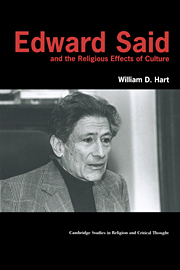Book contents
- Frontmatter
- Contents
- Preface
- Abbreviations
- Preliminary remarks
- 1 Culture as the transfiguration of religious thought
- 2 The religious effects of culture: nationalism
- 3 The religious effects of culture: Orientalism
- 4 The religious effects of culture: imperialism
- 5 The responsibilities of the secular critic
- 6 Marx, Said, and the Jewish question
- Concluding remarks: religion, secularism, and pragmatic naturalism
- Appendix A Whose exodus, which interpretation?
- Appendix B An exchange of letters between Michael Walzer and Edward Said
- Notes
- Select bibliography
- Index of names
Concluding remarks: religion, secularism, and pragmatic naturalism
Published online by Cambridge University Press: 22 September 2009
- Frontmatter
- Contents
- Preface
- Abbreviations
- Preliminary remarks
- 1 Culture as the transfiguration of religious thought
- 2 The religious effects of culture: nationalism
- 3 The religious effects of culture: Orientalism
- 4 The religious effects of culture: imperialism
- 5 The responsibilities of the secular critic
- 6 Marx, Said, and the Jewish question
- Concluding remarks: religion, secularism, and pragmatic naturalism
- Appendix A Whose exodus, which interpretation?
- Appendix B An exchange of letters between Michael Walzer and Edward Said
- Notes
- Select bibliography
- Index of names
Summary
Art is the sole alternative to luck; and divorce from each other of the meaning and value of instrumentalities and ends is the essence of luck. The esoteric character of culture and the supernatural quality of religion are both expressions of the divorce.
Fidelity to the nature to which we belong, as parts however weak, demands that we cherish our desires and ideals til we have converted them into intelligence, revised them in terms of ways and means which nature makes possible. When we have used our thought to its utmost and thrown into the moving unbalanced balance of things our puny strength, we know that though the universe slay us still we may trust, for our lot is one with whatever is good in existence. We know that such thought and effort is one condition of the coming into existence of the better. As far as we are concerned it is the only condition, for it alone is in our power.
(John Dewey, Experience and Nature, pp. 372, 420)But human power is extremely limited, and is infinitely surpassed by the power of external causes; we have not, therefore, an absolute power of shaping to our use those things which are without us. Nevertheless, we shall bear with an equal mind all that happens to us in contravention to the claims of our own advantage, so long as we are conscious, that we have done our duty, and that the power which we possess is not sufficient to enable us to protect ourselves completely; remembering that we are a part of universal nature, and follow her order. […]
- Type
- Chapter
- Information
- Edward Said and the Religious Effects of Culture , pp. 163 - 175Publisher: Cambridge University PressPrint publication year: 2000

